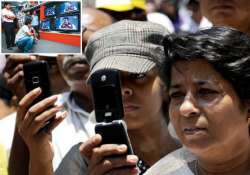91 pc of Delhiites own cellphone, 88 pc have TV, census reveals
New Delhi, May 7: Delhi has shown a substantial improvement in overall living conditions in all socio-economic parameters since the last decade, with around 91 per cent of people having a mobile phone, 88 per

New Delhi, May 7: Delhi has shown a substantial improvement in overall living conditions in all socio-economic parameters since the last decade, with around 91 per cent of people having a mobile phone, 88 per cent owning a TV and 29 per cent possessing computers.
The figures are based on ‘Houselisting and Housing Census 2011' for Delhi.
The report on the first phase of Census 2011, also known as Houselisting and Housing Census released today by Director of Census Operations, National Capital Territory of Delhi (NCT), Varsha Joshi, records an increase in the number of households to 33.4 lakh from 25.5 lakh for the last decade.
Eighty-eight per cent of the population in Delhi own a TV, up from 74.5, while 29.1 percentage of households have computers. Out of this, 17.6 per cent of households have access to internet on their computers.
The Census records a drastic increase in the percentage of households with telephone landlines or mobile services with 90.8 per cent population having one or the other, up from 34.7 per cent for 2001.
The LPG and CNG connections in households accounts for 89.9 per cent of the dwellings up from 34.2 per cent for 2001, a substantial increase.
The banking services amount to 77.7 per cent for 2011, up from 51 per cent of 2001. For the Schedule Caste (SC) households, the percentage is up from 30.6 for 2001 to 68.2 for this decade.
The percentage of population possessing assets have also increased.
Only 2.9 percent of people in the city possess no asset, which was 14.1 per cent for 2001. The percentage for the Schedule Caste (SC) has also dropped with only 4.7 per cent having no assets against 21.1 per cent last decade.
There has been a slight increase in the ownership of various transports with only 37.1 per cent population having no vehicle of their own, against 43.1 per cent for 2001. In all 30.6 per cent possess a bicycle, 38.9 having a bike/ scooter while 20.7 per cent own a car.
Delhi, being the capital, also appears to be well-placed in providing electricity connections as the statistics suggested that 99.1 per cent of the houses here have power supply while only 0.1 per cent does not have any source of lighting in their houses.
0.7 per cent households depend on kerosene for lighting purposes.
The major highlights of the census is the improvement in the quality of housing, both in rural and urban areas, with the rural-urban gap being reduced by seven percentage points from 44 per cent in 2001 to 37 per cent. The general household size has increased from 1-2 persons for 2001 to 3, 4 and 5 for 2011, suggesting that household trend is getting stabilised.
In 3.7 per cent households, only a single person live while 7.6 per cent houses have two persons and 12.8 have three. Twenty-four percent of the households have four members while 20.4 per cent have five members.
The figures are based on ‘Houselisting and Housing Census 2011' for Delhi.
The report on the first phase of Census 2011, also known as Houselisting and Housing Census released today by Director of Census Operations, National Capital Territory of Delhi (NCT), Varsha Joshi, records an increase in the number of households to 33.4 lakh from 25.5 lakh for the last decade.
Eighty-eight per cent of the population in Delhi own a TV, up from 74.5, while 29.1 percentage of households have computers. Out of this, 17.6 per cent of households have access to internet on their computers.
The Census records a drastic increase in the percentage of households with telephone landlines or mobile services with 90.8 per cent population having one or the other, up from 34.7 per cent for 2001.
The LPG and CNG connections in households accounts for 89.9 per cent of the dwellings up from 34.2 per cent for 2001, a substantial increase.
The banking services amount to 77.7 per cent for 2011, up from 51 per cent of 2001. For the Schedule Caste (SC) households, the percentage is up from 30.6 for 2001 to 68.2 for this decade.
The percentage of population possessing assets have also increased.
Only 2.9 percent of people in the city possess no asset, which was 14.1 per cent for 2001. The percentage for the Schedule Caste (SC) has also dropped with only 4.7 per cent having no assets against 21.1 per cent last decade.
There has been a slight increase in the ownership of various transports with only 37.1 per cent population having no vehicle of their own, against 43.1 per cent for 2001. In all 30.6 per cent possess a bicycle, 38.9 having a bike/ scooter while 20.7 per cent own a car.
Delhi, being the capital, also appears to be well-placed in providing electricity connections as the statistics suggested that 99.1 per cent of the houses here have power supply while only 0.1 per cent does not have any source of lighting in their houses.
0.7 per cent households depend on kerosene for lighting purposes.
The major highlights of the census is the improvement in the quality of housing, both in rural and urban areas, with the rural-urban gap being reduced by seven percentage points from 44 per cent in 2001 to 37 per cent. The general household size has increased from 1-2 persons for 2001 to 3, 4 and 5 for 2011, suggesting that household trend is getting stabilised.
In 3.7 per cent households, only a single person live while 7.6 per cent houses have two persons and 12.8 have three. Twenty-four percent of the households have four members while 20.4 per cent have five members.